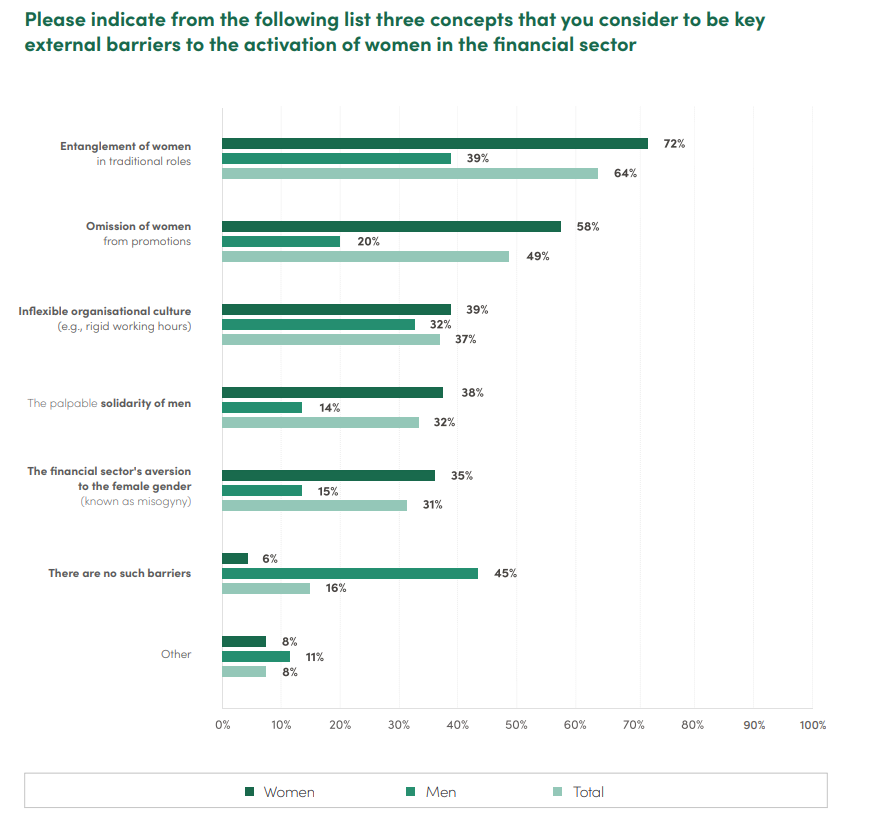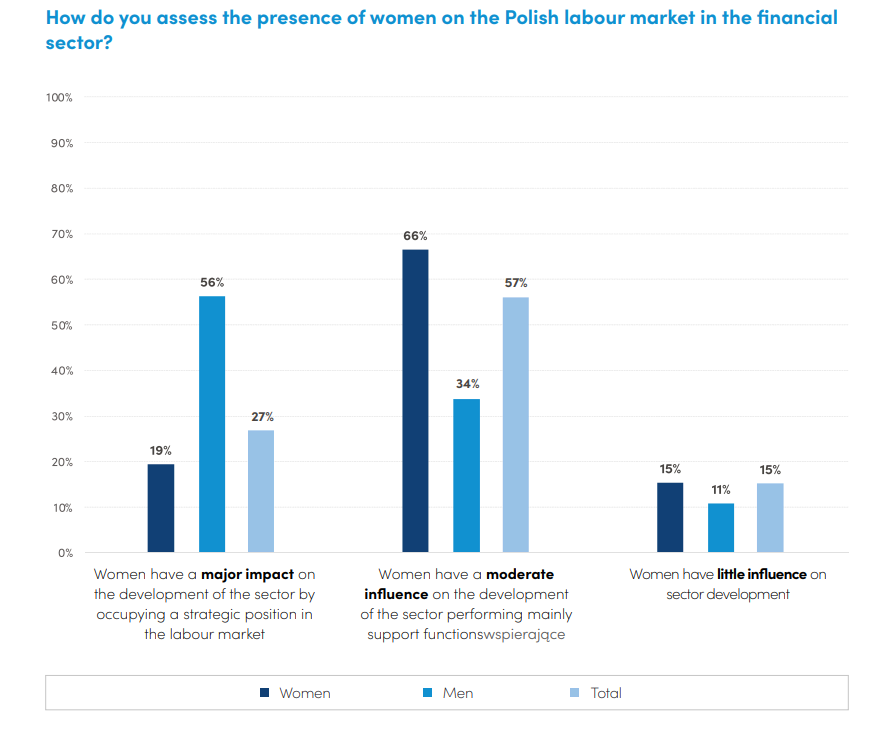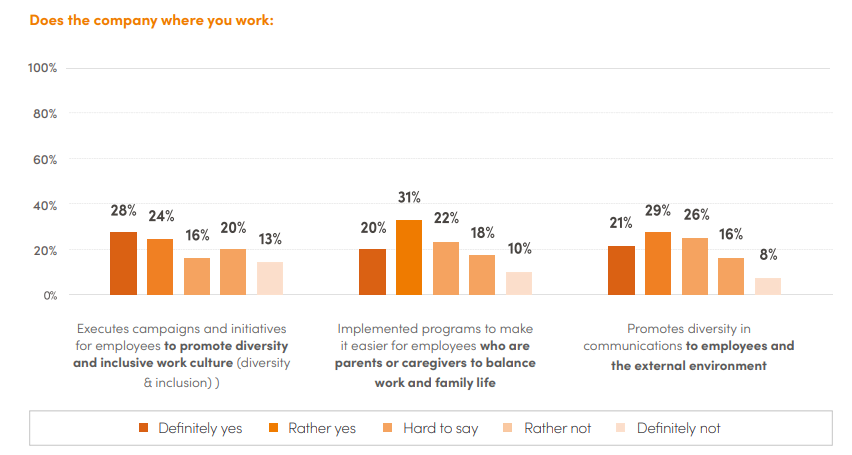The strategic role of women in the financial sector is growing too slowly
93% of women representing the financial sector indicate that career is important or very important to them. At the same time, as many as 94% of women believe that there are barriers in their sector that affect women's careers, according to the 4th edition of the “Women in Finance” survey conducted by Antal together with CFA Society Poland, in cooperation with Bank BPH and the Chamber of Fund and Asset Managers (IZFiA). Moreover, despite the increasing number of development programs and diversity management policies being implemented, women working in the financial industry relatively rarely reach top positions.

Antal, together with the CFA Society Poland, in cooperation with Bank BPH and the Chamber of Fund and Asset Managers (IZFiA), has developed the fourth edition of the “Women in Finance” report, showing the biggest challenges for women in finance. The aim of the study was not only to analyse the current situation in the labour market, but also to distinguish factors that determine women's careers. This year's edition of the study has been extended to include additional research areas related to EU regulations and diversity management.
Women's ambitions still rarely translate into their position in the corporate hierarchy
The results of the survey, which included 766 respondents representing the finance industry, showed that although women in the finance sector are far more likely than men to indicate that career is very important to them (50% vs. 32%), almost all of them perceive barriers that limit their advancement (94%). Interestingly, only 55% of men perceive barriers affecting women's careers
The modern financial world increasingly understands the fact that knowledge and competence, not gender, are critical to success. Financial industry, traditionally considered to be the domain of men, is becoming a great place for women's professional development. However, despite the growing number of development programs designed to support women's careers and a growing number of companies that make diversity part of their strategic goals, still few women reach the top of the corporate hierarchy. It is therefore so important to develop effective solutions and tools to increase opportunities for women's careers and to co-create a space open to dialogue on diversity - says Artur Skiba, CEO of Antal.

The majority of respondents indicated that women have a moderate influence on the development of the sector, occupying mainly support functions - 66%. What is notable in the survey results is the very large difference in the assessment of women's influence on the development of the financial sector and the occupation of strategic positions by gender. Among the men surveyed, as many as 56% (an increase of 18%) believe that women have a great deal of influence in this area, while similarly only 19% of women hold the same view.
The results of the survey show that the women see an even greater need for professional support than in past editions - they expect development programs, training and courses, and mentoring. There is also a gender difference in this aspect. It turns out that men pay less attention to particular forms of stimulating professional development. Although today's gender stereotypes are slowly going into oblivion, their consequences are still evident in what both sexes think and say about the development of women's careers. The survey results showed that the financial sector still has a lot of work to do. It is important to strengthen faith and to support and motivate women to fight for their plans and dreams. That is why it is so important to create programs for female managers so that they are willing and not afraid to climb the next career ladder. At CFA, we have been supporting women's development on both professional and personal levels for years. Support and networking play a very important role in this process, as we are committed to building an inclusive and diverse organisation where women and men have equal opportunities - says prof. Krzysztof Jajuga, president of CFA Society Poland.

Increasing the number of women at all levels of the organisation requires programs within companies
The study confirmed the correlation of barriers and factors that can overcome the lack of diversity in top positions in the financial sector. When asked what helps women's careers, 89% of respondents answered that flexible working hours, 87% - increasing household income, and 86% - that the presence of other women in strategic positions. At the same time, respondents identified as the main barriers to women's careers their entanglement in traditional roles (72% of responses), the difficulty of reconciling work and private life - mainly in the case of women raising children (65%), and so-called facade modesty (59% of responses).
In turn, career satisfaction is primarily influenced by the atmosphere at work (74%) and high salaries (70%). The biggest difference between men and women is seen in the aspect of the importance of flexible forms of employment (affects satisfaction of 51% of women and 38% of men) and recognition at work (affects satisfaction of 66% of women and 54% of men).
In order for women to begin to play an equal role to men in the economy, an ecosystem with initiatives to increase women's labour force participation and numbers at all levels of management is crucial. Among the many initiatives to support women's careers, the ability to adjust working hours to accommodate other responsibilities, especially those related to childcare, is very important. A wide range of solutions that allow employees to design their working hours more freely could reduce women's perceived pressure and requirement to be fully available at work. I must admit that I am also waiting for the result of the entry into force of EU regulations, which provide that by 30 June 2026 at least 40 percent of the minority gender in the positions of non-executive directors or 33 percent in all director positions will have to be present on the boards of large companies - says Małgorzata Rusewicz, president of the Chamber of Fund and Asset Managers.
Implementation of sustainability principles determines brand value in the eyes of employees, investors and clients
This year's edition of the study has been extended to include additional research areas related to EU regulations and diversity management. The results of the study showed that inclusivity in the organisation and the pursuit of social cohesion are aspects whose importance and role continue to grow. It turns out that half of the respondents are guided in their job choice by the congruence between the views manifested by the company on diversity management and their own beliefs. At the same time, about ¼ of the respondents, both men and women, do not know if their organisations have formalised diversity policies in place. Significantly, despite the implementation of EU regulations and ESG-related measures, up to 58% of women still believe they are overlooked for promotions due to their gender. Interestingly, the percentage of men who perceive these barriers is much lower, at 39% and 20%, respectively.
For the past several years, since successive editions of the “Women in Finance” report have been produced, the share of women in top positions in the financial sector has not approached a significant level. There are still financial institutions in the market that do not have a single woman on the board of directors, and their representation in managerial positions is still far from 50/50 balance. Simply stating that our company has a diversity & inclusion agenda is not enough. It is essential to make real changes that confirm the appreciation of diversity - comments Małgorzata Romaniuk, Vice-President of the Management Board, Bank BPH.

I believe that the sustainability ventures that companies are developing and the ESG regulatory changes will positively affect the recruitment decisions of organisations. Paradoxically, male-dominated industries may be an even better place for women thinking about a management career now that diversity management is growing in importance, says Michał Borkowski, Regional Manager, Finance & Accountancy Antal.
About the study
The fourth edition of the “Women in Finance” report is based on a survey conducted on 14.12.22-22.01.23 using the CAWI method among 766 respondents representing the financial sector. The survey was conducted by Antal together with CFA Society Poland, in cooperation with Bank BPH and the Chamber of Fund and Asset Managers (IZFiA). The purpose of the study is to analyse the current situation in the labour market and distinguish factors that determine women's careers. The report is available for download at: https://antal.pl/wiedza/raporty














